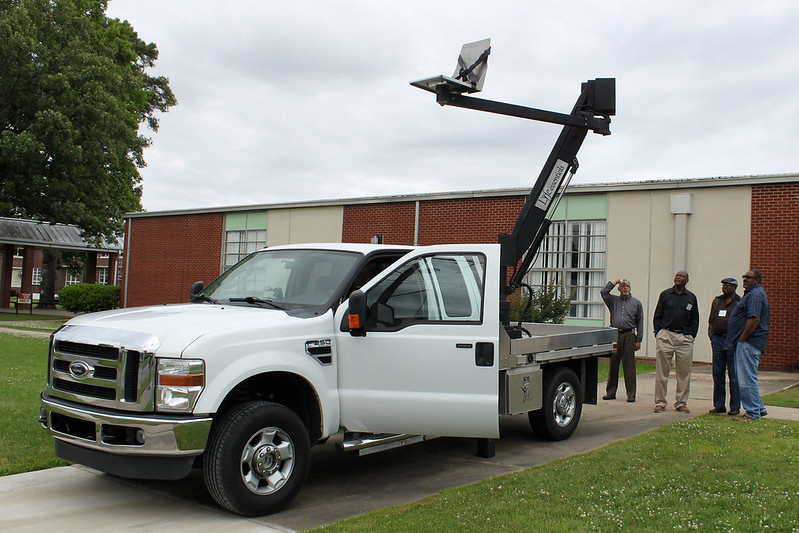AgrAbility helps disabled farmers, ranchers get back to work
By Carol Sanders
UAPB School of Agriculture, Fisheries and Human Sciences
(660 words)
PINE BLUFF, Ark. – With farming and ranching ranked as one of the most dangerous occupations in the U.S., farmers are hard hit by disability, said Dr. David Fernandez, Cooperative Extension Program livestock specialist at the University of Arkansas at Pine Bluff.
The production of crops, livestock and dairy products is ranked the eighth most dangerous occupation by the U.S. Bureau of Labor Statistics.
FLATBED TRUCK LIFT - Modifications to farm equipment can help farmers continue farming. This flatbed truck lift will make most farm machinery accessible. It is mounted behind the cab of the truck. Users can bring the lift seat around to the driver’s door, transfer into the lift seat and go directly up and into their equipment. The system is operated by radio remote. (Photo by Will Hehemann)
Most Arkansas farms are small and family owned; so families may not have the resources to recover if the primary farmer becomes disabled, said Dr. Fernandez.
Disability is often associated with a major injury, but one of the leading causes of disability is aging, especially arthritis. And, farmers across the country are getting older. The average age is now 57 up from 55 a couple of years ago, said Dr. Fernandez.
Arthritis sometimes makes completing farm tasks difficult or impossible. Often, something as simple as an additional step on a tractor allows an arthritic famers to climb aboard a tractor again. Hand controls instead of foot pedals can enable a paraplegic farmer to operate equipment and farm. Injured war veterans and accident victims can farm with equipment modifications.
Farmers are often hit hard by disability because a farmer or rancher is not only what they are but who they are, said Dr. Fernandez. When they cannot farm, they may become depressed. Enabling farmers and ranchers to get back to farming helps them overcome depression and reestablish self-worth. They can once again become independent providers for their families just as they did before becoming disabled, said Fernandez.
AgrAbility, a U.S. Department of Agriculture program, helps producers overcome barriers to farming. It provides on-site assessments to identify barriers; makes recommendations on tools and services to overcome these barriers; provides information, education and training; refers farmers to potential assistance including financial; and connects farmers with other farmers who have successfully overcome their disabilities and who serve as peer mentors.
UAPB recently hosted an AgrAbility workshop conducted by an AgrAbility team from Purdue University. With the Purdue University team were three disabled Arkansas farmers. One was a 23-year-old paralyzed in a four-wheeler accident. He was proud that he could help on the family farm by cutting and hauling hay.
A former lineman who had lost both arms after being shocked while working on transmission lines is successfully raising a herd of several hundred beef cattle, said Fernandez. A man in his 50s who is legally blind is raising championship Pomeranians and planning to add livestock to his farm even as his eyesight continues to deteriorate.
AgrAbility does not provide funds to disabled farmers and ranchers, said Fernandez, but many of its partner organizations do. For example, Arkansas Rehabilitation Services and vocational rehabilitation programs in other states can provide loaner equipment and sometimes funding to assist disabled farmers get back to work, he said.
For more information about the AgrAbility program, contact Dr. Henry English, head of the Small Farm Program at UAPB, at (870) 575-7246 or englishh@uapb.edu or an Extension associate. Also, for AgrAbility information or questions about livestock, contact Dr. Fernandez at (870) 575-7214 or fernandezd@uapb.edu.
UAPB Extension associates are Alex Cole, (870) 630-2005, eaec@sbcglobal.net – St Francis, Crittenden, Cross, Woodruff, Jackson and Mississippi counties; Arlanda Jacobs, (870) 714-553, aj72342@gmail.com – Lee, Phillips, Monroe and Arkansas counties; Travis Collins, (870) 355-7007, cityofeudora.collins@gmail.com – Chicot, Desha and Drew counties; Kandi Williams, (870) 903-8663, klwilliams42@gmail.com – Hempstead, Howard, Little River and Miller counties; and Stephan Walker, multi-county agent, (870) 575-7237, walkers@uapb.edu – Jefferson, Lincoln, Desha, Pulaski and Lonoke counties.
Pursuant to 7 CFR § 15.3, the University of Arkansas System Division of Agriculture offers all its Extension and Research programs and services (including employment) without regard to race, color, sex, national origin, religion, age, disability, marital or veteran status, genetic information, sexual preference, pregnancy or any other legally protected status, and is an equal opportunity institution.
# # #
Media Contact: Carol SandersUAPB School of Agriculture, Fisheries and Human Sciences
(870) 575-7238
sandersc@uapb.edu
Related Links
